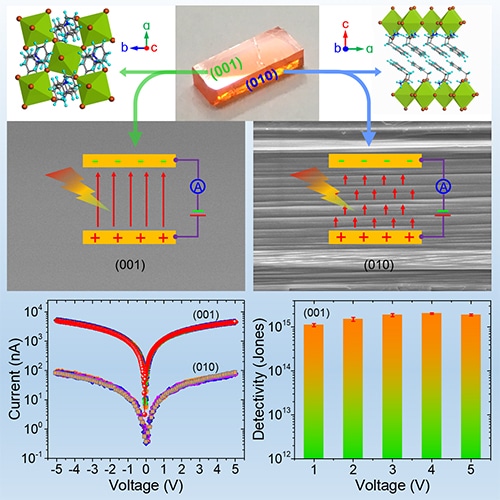May 16 2019
A team of researchers under the guidance of Prof. LIU Shengzhong from the Dalian Institute of Chemical Physics (DICP) of the Chinese Academy of Sciences and Dr XU Zhuo from Shaanxi Normal University (SNNU) developed a method for synthesizing large-sized two-dimensional (2D) perovskite single crystals (PSCs) to realize highest photodetector performance among this type.
 The (001) plane presented the highest photodetectivity. (Image credit: DICP)
The (001) plane presented the highest photodetectivity. (Image credit: DICP)
The study outcomes have been reported in Matter. The superior optoelectronic properties and promising stability of 2D-layered organic–inorganic hybrid perovskites have allowed them to perform better in certain applications compared with their three-dimensional (3D) counterparts. Specifically, 2D perovskites fabricated on the (001) plane exhibit better performance in certain optoelectronic devices.
The researchers created a surface tension-controlled crystallization technique for synthesizing large 2D (C6H5C2H4NH3)2PbI4 ((PEA)2PbI4) PSCs. Using this method, they collected some inch-sized 2D (PEA)2PbI4 PSCs with the largest reaching 36 mm in length, leading to extraordinary performance of the device.
As shown with the density function theory, their crystal structures exhibit anisotropy-dependent optoelectronic performance. In particular, the photodetectors fabricated on the (001) plane show a higher responsivity of about 139.6 A/W, detectivity of 1.89 × 1015 cmHz1/2/W, external quantum efficiency of 37719.6%, and response speed as quick as 21 µs.
These results will pave the way for stable high-performance photodetectors and will open the door for commercialization of PSCs for photoelectronic applications.
The research was supported by the National Key Research and Development Program of China, the National Natural Science Foundation of China, the National University Research Fund, and the 111 Project.